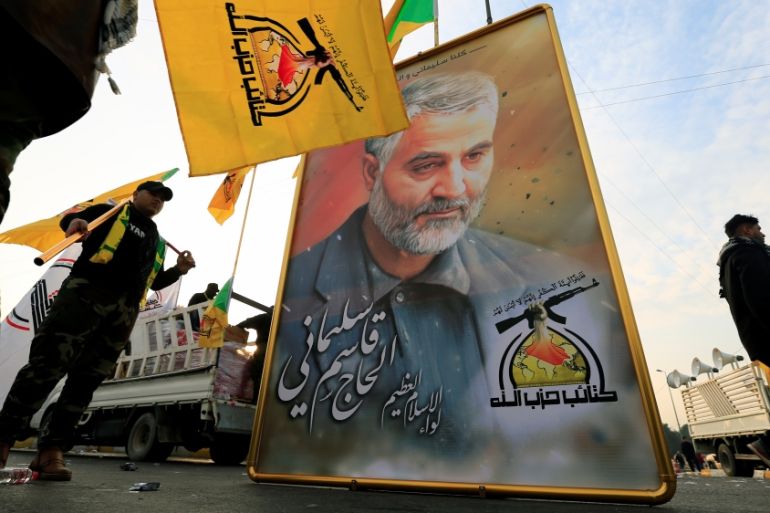Pro-Iran factions’ truce with US in Iraq ‘short-term’: Lawmaker
Ceasefire only temporary and depends on Washington completing a full military withdrawal by year-end, key parliamentarian says.

Pro-Iran factions in Iraq will cease targeting United States troops but their proposed truce is only temporary and depends on Washington completing a full military withdrawal by year-end, a key lawmaker said.
About 90 rocket attacks have targeted US interests in Iraq since January, including forces housed in Iraqi bases and the US embassy in Baghdad’s high-security Green Zone, with several claimed by pro-Iran factions. The most prominent pro-Iran group declared a ceasefire from Sunday.
Keep reading
list of 4 itemsIran says deal reached to unlock funds frozen in Iraq
Iraqis hit out at insecurity as seven buried after anti-US attack
Iraq denounces ‘dangerous’ US embassy pullout threat
“The truce isn’t open-ended,” Ahmed al-Assadi, a lawmaker representing the political arm of pro-Iran armed coalition Hashd al-Shaabi, told AFP news agency late Wednesday.
“In my estimation, at its earliest, it could end around the US elections,” scheduled to take place on November 3, “or it could last until the end of the year,” he added.
In early January, Iraq’s parliament voted to expel American soldiers from its soil two days after a US drone strike killed top Iranian general Qassem Soleimani and his Iraqi lieutenant Abu Mahdi al-Muhandis.
“A truce lasting longer than the end of the year doesn’t make much sense. We’re only giving the government more time to negotiate the withdrawal,” al-Assadi added.
Fragile truce
The Hashd al-Shaabi paramilitaries were established in 2014 from mostly-Shia militia and volunteers to fight the armed group ISIL (ISIS).
Hashd has formally been part of Iraq’s armed forces since then, holding political representation in parliament, but it also spawned several armed groups ideologically affiliated with it.
Kataib Hezbollah, the most pro-Iran armed faction in the country, has consistently been blamed by Washington for the rocket attacks.
But other smaller and newer groups have taken responsibility for the strikes, including one targeting a logistics convoy heading to a US base on Sunday in Diwaniyah, in the country’s south.
Another Hashd source said the current fragile truce was the result of discussions between pro-Iran factions, the government and foreign missions in Baghdad.
Prime Minister Mustafa al-Kadhimi’s government – seen as friendly to the US – said recently that American troops might need up to three years to pull out from Iraq.
The US deployed thousands of troops in the country in 2014 to lead a military intervention against ISIL.
By late 2018, there were an estimated 5,200 troops still stationed in Iraq, according to US officials.
On Thursday, the US shut down Kataib Hezbollah’s website with a “seizure warrant” message from the commerce department emblazoned on its page.
Earlier in the week, the al-Etejah and al-Nujaba media channels were also blocked by the US government.
They are channels for factions composed of Iraqi fighters armed and financed by Iran with affiliations to Hashd al-Shaabi.
Some of the fighters are operating in support of President Bashar al-Assad’s government in Syria, alongside Lebanese group Hezbollah.